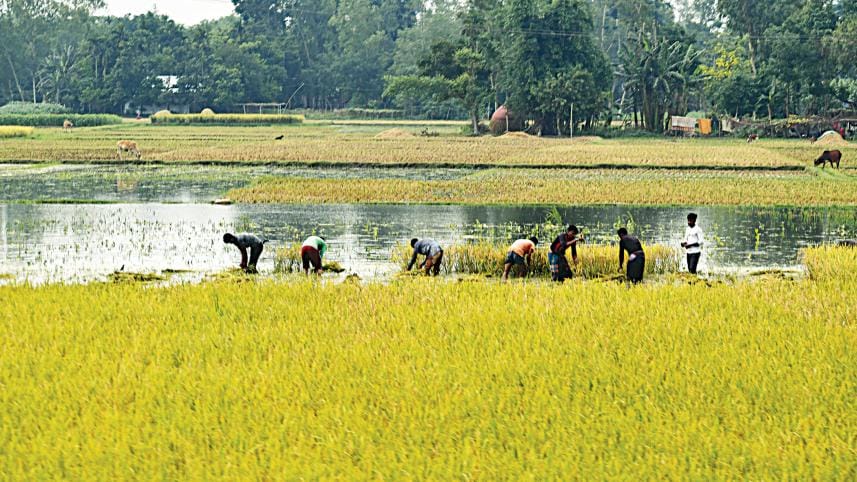Price of finer paddy goes up

Prices of paddy, particularly the finer varieties, are on the rise in the producing regions in Bangladesh amid worries of crop damages and lower yield inflicted by the recent flash floods in the haor districts and cyclone Ashani-induced rainfalls.
The finer quality grain, which is popular among the middle- and upper-income groups, costs up to around Tk 1,100 each maund (40 kilogramme), up 10 per cent since May 3, said millers and traders yesterday.
The spike comes at a time when consumers are suffering from higher inflation fuelled by rising prices of foods, including edible oil and flour.
Inflation touched a 17-month high of 6.22 per cent in March.
An Indian ban on wheat export intensified fears of a further hike in the price of the grain since 86 per cent of Bangladesh's domestic demand is met through imports.
"Paddy prices were supposed to decline but we see an upward trend. The overall production and yield do not seem to be satisfactory," said Nirod Boron Saha, president of the Paddy and Rice Stockists and Wholesalers' Association in Naogaon, one of the main rice hubs in the north, the biggest rice-producing zone in the country.
Floods in the haor areas, rainfalls and the cyclone have affected the crop. The yields from paddy after milling are also low, he said, adding that the prices of the coarse grain have, however, remained almost unchanged compared to the previous year.
The Department of Agricultural Extension (DAE) estimates that farmers planted paddy on 49 lakh hectares during the Boro season this year and targeted to produce 2.09 crore tonnes of rice during the season. The Boro season accounts for roughly 55 per cent of annual rice production.
The latest acreage is 9 per cent higher than 45 lakh hectares estimated by the Bangladesh Bureau of Statistics.
According to the DAE, the floods and rainfalls fully damaged 8,000 hectares of Boro paddy crop.
Traders, however, say the extent of the damage in terms of yield loss is higher as the number of grains is low.
"The price of the finer paddy has been increasing since last week," said Abdur Rouf, a farmer at Rajosh village under Gaibandha's Gobindaganj upazila.
The current price is Tk 1,100-Tk 1,140 per maund. It was Tk 1,000-Tk 1,050 per maund in the same period the previous year, he added.
Abdul Mannan, another farmer of Satar village under Joypurhat's Kalai upazila, said the demand for the fine varieties of paddy was better this year compared to last year.
"If the weather improves, the prices are likely to increase further," said Sohel Rana, a seasonal trader in Gobindaganj.
Chitta Majumder, managing director of Majumder Group of Industries, said the unfavourable weather had badly affected Boro paddy.
"The government should be cautious," he said, suggesting the government consider removing or cutting import duty on rice to increase the supply in the domestic market.
Saha echoed Majumder and recommended steps to import rice under government-to-government contracts.
DAE Additional Director for Field Services Wing Habibur Rahaman Chowdhury, however, calls the damage insignificant, saying the production would be around 2.20 crore tonnes this Boro harvesting season.
"The country will not face any problem," he said.





 For all latest news, follow The Daily Star's Google News channel.
For all latest news, follow The Daily Star's Google News channel.
Comments